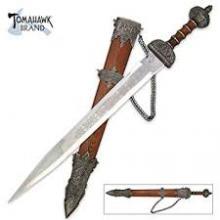Last Supper after apostles show him two swords.
Luke 22:38 ... It is enough.
Luke 22:38 ... That’s enough!
It is sufficient.
From the singular form of the words, we can tell that Jesus is referring to having the swords, not the swords themselves. The word translated "enough" was only used by Jesus in two verses.
Enough is enough.
It is enough.
That(CW) ’s enough!
- CW --Confusing Word -- This is not what is usually translated as "that".
It -- This is from the third-person, singular form of the verb.
is -- The verb "is" here is the common form of "to be" in Greek. It means to have a certain characteristic or remain in a certain condition. It also equates terms or assigns characteristics.
enough -- "Enough" is from an adjective that means "sufficing", "becoming", "befitting", "competent to do", "capable", "sufficient" and "satisfactory".
That -- (CW) This is from the third-person, singular form of the verb. This is not what is usually translated as "that".
’s -- The verb "is" here is the common form of "to be" in Greek. It means to have a certain characteristic or remain in a certain condition. It also equates terms or assigns characteristics.
enough -- "Enough" is from an adjective that means "sufficing", "becoming", "befitting", "competent to do", "capable", " sufficient" and "satisfactory".
Ἱκανόν [2 verses]( adj sg neut nom ) "Enough" is hikanos, which means "sufficing", "becoming", "befitting", "competent to do", " capable", " sufficient" and "satisfactory".
ἐστιν. (verb 3rd sg pres ind act) "Is" is eimi, which means "to be", "to exist", "to be the case", of circumstance and events "to happen" and "is possible". (The future form is "esomai". The 3rd person present indicative is "esti".)

